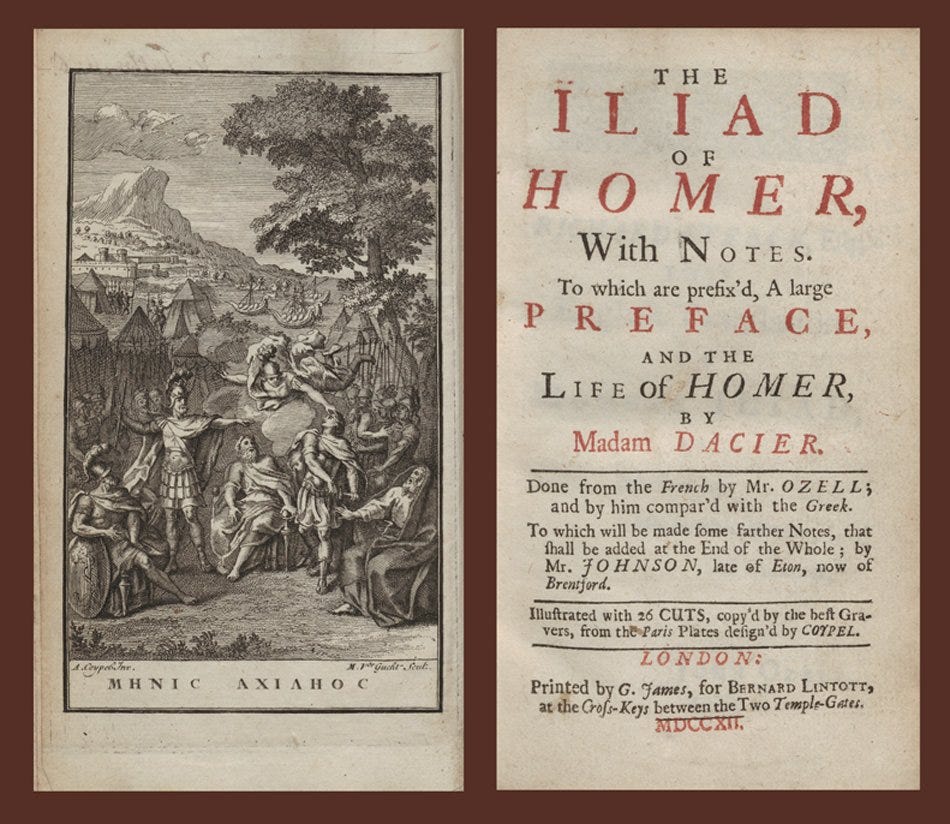Reading Homer in Translation
A discussion of the various English translations
Exploring Life and Literature.
*Regular newsletters appear on Tuesdays. The Deep Reads Book Club newsletters appear on Fridays. You can find all the book club details at the link below.*
There are hundreds of translations of Homer’s works in the English language and vastly more when you start looking at other languages. When deciding which to choose as the best option, you should read the same selection from a variety of different translations so you can get a feel for what works best for you. The older the translation, the more archaic the language. If you are familiar with these poems and have read them before, then perhaps an older translation will be fine to give you a different rendering of the tale. However, I recommend a more modern translation if you are a first-timer or even a second-timer. The language will be simpler, and you won’t be fighting with the text as much to make sense of it. Here is the Greek followed by several of the more popular English translations. In the video below, you will hear me read a couple of the translations.
Greek Text
μῆνιν ἄειδε θεὰ Πηληϊάδεω Ἀχιλῆος οὐλομένην, ἣ μυρί᾽ Ἀχαιοῖς ἄλγε᾽ ἔθηκε, πολλὰς δ᾽ ἰφθίμους ψυχὰς Ἄϊδι προΐαψεν ἡρώων, αὐτοὺς δὲ ἑλώρια τεῦχε κύνεσσιν οἰωνοῖσί τε πᾶσι, Διὸς δ᾽ ἐτελείετο βουλή, ἐξ οὗ δὴ τὰ πρῶτα διαστήτην ἐρίσαντε Ἀτρεΐδης τε ἄναξ ἀνδρῶν καὶ δῖος Ἀχιλλεύς. τίς τ᾽ ἄρ σφωε θεῶν ἔριδι ξυνέηκε μάχεσθαι; Λητοῦς καὶ Διὸς υἱός: ὃ γὰρ βασιλῆϊ χολωθεὶς νοῦσον ἀνὰ στρατὸν ὄρσε κακήν, ὀλέκοντο δὲ λαοί, οὕνεκα τὸν Χρύσην ἠτίμασεν ἀρητῆρα Ἀτρεΐδης:
Robert Fagles translation (the one I will primarily use)
Rage—Goddess, sing the rage of Peleus' son Achilles,
murderous, doomed, that cost the Achaeans countless losses,
hurling down to the House of Death so many sturdy souls,
great fighters' souls, but made their bodies carrion,
feasts for the dogs and birds,
and the will of Zeus was moving toward its end.
Begin, Muse, when the two first broke and clashed,
Agamemnon lord of men and brilliant Achilles.
What god drove them to fight with such a fury?
Apollo the son of Zeus and Leto. Incensed at the king
he swept a fatal plague through the army—men were dying
and all because Agamemnon spurned Apollo's priest.Emily Wilson translation (an excellent choice and the most recent translation)
Goddess, sing of the cataclysmic wrath of great Achilles, son of Peleus, which caused the Greeks immeasurable pain and sent so many noble souls of heroes to Hades, and made men the spoils of dogs, a banquet for the birds, and so the plan of Zeus unfolded—starting with the conflict between great Agamemnon, lord of men, and glorious Achilles. Which god set the pair apart and prompted them to fight? Apollo, son of Leto and of Zeus. Furious at the son of Atreus, the god spread deadly plague throughout the camp, so that the common troops began to die, because their leader, Agamemnon, treated Chryses, Apollo's priest, with disrespect.
Stanley Lombardo translation
Rage:
Sing, Goddess, Achilles' rage,
Black and murderous, that cost the Greeks
Incalculable pain, pitched countless souls
Of heroes into Hades' dark,
And left their bodies to rot as feasts
For dogs and birds, as Zeus' will was done.
Begin with the clash between Agamemnon—
The Greek warlord—and godlike Achilles.
Which of the immortals set these two
At each other's throats?
Apollo,
Zeus' son and Leto's offended
By the warlord. Agamemnon had dishonored
Chryses, Apollo's priest, Sing, goddess, the anger of Peleus' son Achilleus
and its devastation, which put pains thousandfold upon the Achaians,
hurled in their multitudes to the house of Hades strong souls
of heroes, but gave their bodies to be the delicate feasting
of dogs, of all birds, and the will of Zeus was accomplished
since that time when first there stood in division of conflict
Atreus' son the lord of men and brilliant Achilleus.
What god was it then set them together in bitter collision?
Zeus' son and Leto's, Apollo, who in anger at the king drove
the foul pestilence along the host, and the people perished,
since Atreus' son had dishonored Chryses, priest of Apollo,Samuel Butler translation (more of a prose translation than verse)
Sing, O goddess, the anger of Achilles son of Peleus, that brought countless ills upon the Achaeans. Many a brave soul did it send hurrying down to Hades, and many a hero did it yield a prey to dogs and vultures, for so were the counsels of Jove fulfilled from the day on which the son of Atreus, king of men, and great Achilles, first fell out with one another.
And which of the goes was it that set them on to quarrel? It was the son of Jove and Leto; for he was angry with the king and sent a pestilence upon the host to plague the people, because the son of Atreus had dishonoured Chryses his priest.Alexander Pope translation
Finally, for historical perspective, here is one of the most famous English translations, that of Alexander Pope in 1899. You will notice there are stark differences between this version and the others above.
Achilles’ wrath, to Greece the direful spring Of woes unnumber’d, heavenly goddess, sing! That wrath which hurl’d to Pluto’s gloomy reign The souls of mighty chiefs untimely slain; Whose limbs unburied on the naked shore, Devouring dogs and hungry vultures tore. Since great Achilles and Atrides strove, Such was the sovereign doom, and such the will of Jove!
So you can see, while they all have similar content, there are creative differences, and this is observed throughout the poems. While I will be using the Fagles and Wilson translations in most of our discussions, I may sometimes refer to other translations. You are, of course, welcome to use whichever you prefer.
I hope this has been helpful as you decide which translation to use. If you are having a difficult time then I simply recommend defaulting to either the Fagles or Wilson translations as those will be our main source during this reading.
Beyond the Bookshelf is a reader-supported publication. If you are looking for ways to support Beyond the Bookshelf, please visit my support page and see the ways you can help continue the mission of exploring the connection between life and literature.
Until next time,









I will be using Emily Wilson’s translation. She sings to me as well.
Oh I love this! Thank you for doing the work of comparison. Words are so much fun (and so important)